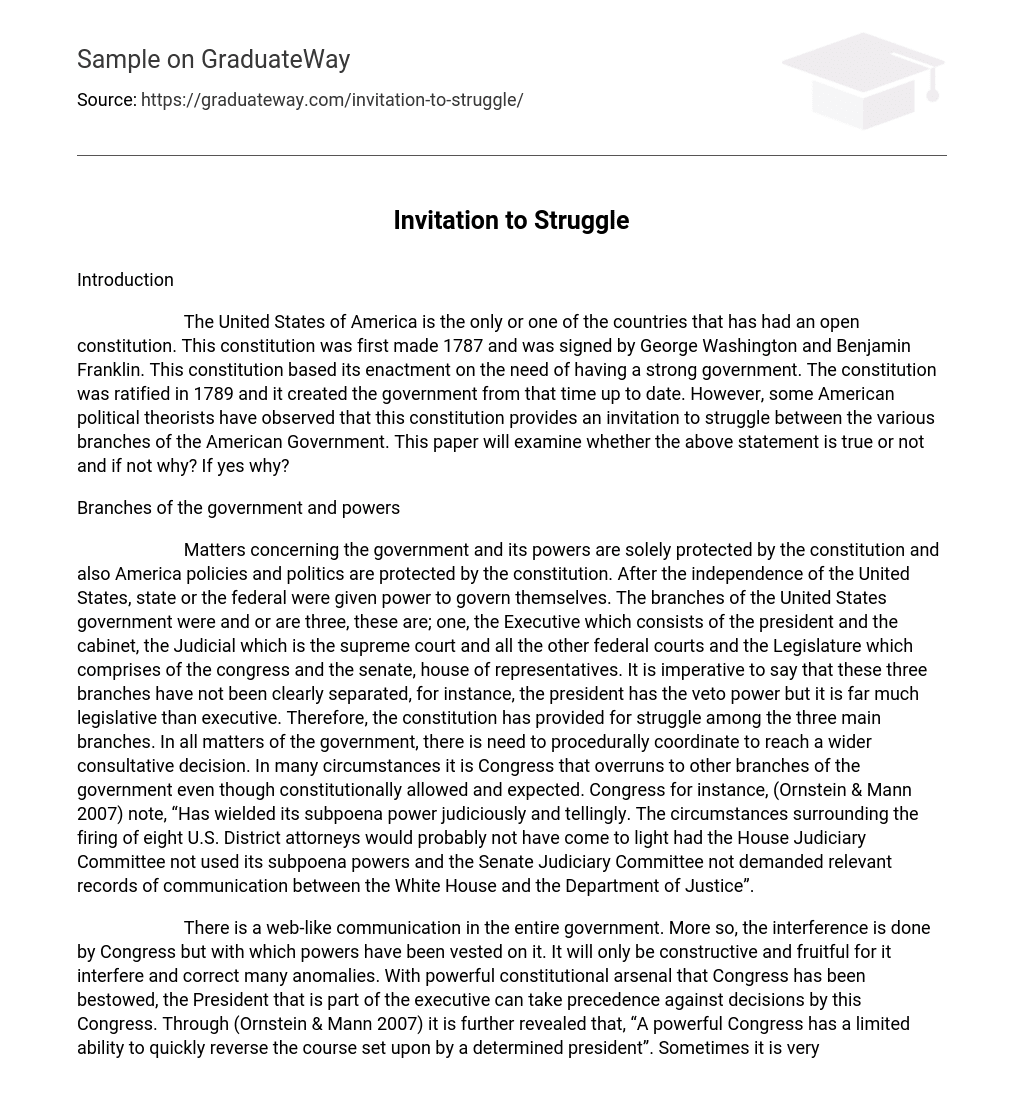Introduction
The United States of America is the only or one of the countries that has had an open constitution. This constitution was first made 1787 and was signed by George Washington and Benjamin Franklin. This constitution based its enactment on the need of having a strong government. The constitution was ratified in 1789 and it created the government from that time up to date. However, some American political theorists have observed that this constitution provides an invitation to struggle between the various branches of the American Government. This paper will examine whether the above statement is true or not and if not why? If yes why?
Branches of the government and powers
Matters concerning the government and its powers are solely protected by the constitution and also America policies and politics are protected by the constitution. After the independence of the United States, state or the federal were given power to govern themselves. The branches of the United States government were and or are three, these are; one, the Executive which consists of the president and the cabinet, the Judicial which is the supreme court and all the other federal courts and the Legislature which comprises of the congress and the senate, house of representatives. It is imperative to say that these three branches have not been clearly separated, for instance, the president has the veto power but it is far much legislative than executive. Therefore, the constitution has provided for struggle among the three main branches. In all matters of the government, there is need to procedurally coordinate to reach a wider consultative decision. In many circumstances it is Congress that overruns to other branches of the government even though constitutionally allowed and expected. Congress for instance, (Ornstein & Mann 2007) note, “Has wielded its subpoena power judiciously and tellingly. The circumstances surrounding the firing of eight U.S. District attorneys would probably not have come to light had the House Judiciary Committee not used its subpoena powers and the Senate Judiciary Committee not demanded relevant records of communication between the White House and the Department of Justice”.
There is a web-like communication in the entire government. More so, the interference is done by Congress but with which powers have been vested on it. It will only be constructive and fruitful for it interfere and correct many anomalies. With powerful constitutional arsenal that Congress has been bestowed, the President that is part of the executive can take precedence against decisions by this Congress. Through (Ornstein & Mann 2007) it is further revealed that, “A powerful Congress has a limited ability to quickly reverse the course set upon by a determined president”. Sometimes it is very healthy for such over rulings; they may keep one branch of the government in toes especially the Legislature through its branch of Congress keeps the Executive on check and on toes. However much there will be interference here and there by among the three branched of the government, it is wise as some experts may agree for the reason that they have been constitutionally allowed and business is done and accomplished, which implies that if it were not this way then one branch of the government would have been or will be complacent.
Moreover, the founding fathers had seen and experienced the way the British form of government was doing its operations and therefore the founding fathers did not and never wanted to duplicate such form of government that was corrupt and inefficient. They decided to have a government that checks and balances come from within it. This struggle among or between the braches has not caused any power or decision vacuum. May be the argument will be that, the funding fathers decided to have this kind of government deliberately. The founding fathers wanted Congress to be powerful but along the way many of the constitutional clauses have been amended to fit circumstances and end up giving another branch of the government powers almost equivalent to the ones of Congress. A very good example is when the President Bush without much and calculated blessings from the congress he declared war on Iraq.
Conclusion
The struggle among the government branches whether deliberately or mistakenly allowed, it has bore fruits in many occasions. However, the ideas of the founding fathers should be encouraged and cultivated so that much power in not invested in presidency but in Congress.
References:
Goehlert, R. & Reynolds, H. (1988). The Executive Branch of the Government: A Bibliography. Oxford: Greenwood Press.
Ornstein, N. J. & Mann, T. E. (2007). The Hill is Alive With the Sound of Hearings. From foregnaffairs.org, Updated, March 21, 2007.
Rosen, J. (2007). In Wartime, Who Has the Power? Washington Post. Published In March 4, 2007





